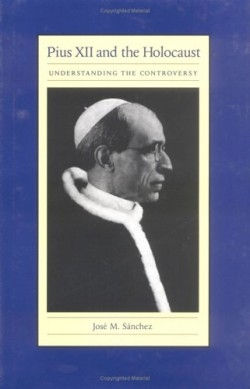Pius XII and the Holocaust
Understanding the Controversy
Pope Pius XII, head of the Roman Catholic Church during World War II, did not speak out publicly against the destruction of Europe’s Jews. With increasing frequency over the years, scholars have addressed the issue of papal silence and attempted to understand it.
The pope’s motivating factors, historians believe, include: his desire to remain neutral in order to negotiate peace; his belief that a public condemnation of Nazi policies would make matters worse for Jews and Catholics alike; and his concern that German Catholics, including the clergy, would reject his protest and leave the church. More hostile critics focus on several alleged personal attitudes of the pope, including anti-Semitism, indifference to Jewish suffering, fear of being kidnapped, admiration for Germany, and a fanatic hatred of Bolshevism.
Defenders of Pius XII claim that he was the scapegoat for the Nazis and that he spoke out against the destruction of the defenseless in unspecific, but all-inclusive terms. In his examination of this historic controversy, the author, a history professor at Saint Louis University, looks at the pope’s behavior and motivation in the context of the events as they happened, rather than in the abstract.
“It is only by doing so,” Sánchez writes, “that we can understand why Pius acted the way he did; it should also help to clarify the meaning of such terms as the ‘silence’ of the pope and to lay to rest some of the myths that surround the enigma of Pius and the Holocaust.”
Sánchez begins with a brief history of Pius’s early years; then he questions how much the pope knew about the Holocaust. He examines the reasons that Pius did not issue a strong statement denouncing the German treatment of defenseless civilians, including Vatican diplomacy, and what the author calls the “crisis of conscience” that German Catholics would have faced had the pope opposed the Nazi terror, forcing them to choose between their church and their country.
Sánchez also examines the argument that Pius feared Communism more than Nazism. He discusses the pope’s offer to serve as a mediator in 1939, and delves into the pope’s personality, describing him as omniscient “about everything except the one thing most important to his reputation-his silence on the Holocaust.”
The author, a practicing Catholic, quotes extensively from many of the books written on the subject, and attempts to refute much of the criticism by the pope’s harshest detractors. He concludes that Pius’s dual responsibilities as Vicar of Christ and leader of the church became impossible to reconcile in order to satisfy the critics who would come to judge his wartime role.
Reviewed by
George Cohen
Disclosure: This article is not an endorsement, but a review. The publisher of this book provided free copies of the book to have their book reviewed by a professional reviewer. No fee was paid by the publisher for this review. Foreword Reviews only recommends books that we love. Foreword Magazine, Inc. is disclosing this in accordance with the Federal Trade Commission’s 16 CFR, Part 255.

